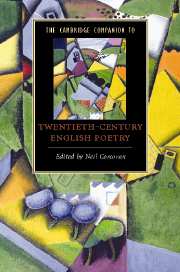Book contents
- Frontmatter
- Introduction
- Part I Contexts
- Part II Moderns
- Part III Modernists
- Part IV Later Modernities
- 10 Philip Larkin: a late modern poet
- 11 R. S. Thomas and modern Welsh poetry
- 12 Gender, feminism, poetry: Stevie Smith, Sylvia Plath, Jo Shapcott
- 13 Varieties of poetic sequence: Ted Hughes and Geoffrey Hill
- 14 Black British poetry and the translocal
- 15 Poetry and class: Tony Harrison, Peter Reading, Ken Smith, Sean O’Brien
- 16 A Scottish Renaissance: Edwin Morgan, Douglas Dunn, Liz Lochhead, Robert Crawford, Don Paterson, Kathleen Jamie
- 17 Lyric adaptations: James Fenton, Craig Raine, Christopher Reid, Simon Armitage, Carol Ann Duffy
- Index
17 - Lyric adaptations: James Fenton, Craig Raine, Christopher Reid, Simon Armitage, Carol Ann Duffy
from Part IV - Later Modernities
Published online by Cambridge University Press: 28 January 2008
- Frontmatter
- Introduction
- Part I Contexts
- Part II Moderns
- Part III Modernists
- Part IV Later Modernities
- 10 Philip Larkin: a late modern poet
- 11 R. S. Thomas and modern Welsh poetry
- 12 Gender, feminism, poetry: Stevie Smith, Sylvia Plath, Jo Shapcott
- 13 Varieties of poetic sequence: Ted Hughes and Geoffrey Hill
- 14 Black British poetry and the translocal
- 15 Poetry and class: Tony Harrison, Peter Reading, Ken Smith, Sean O’Brien
- 16 A Scottish Renaissance: Edwin Morgan, Douglas Dunn, Liz Lochhead, Robert Crawford, Don Paterson, Kathleen Jamie
- 17 Lyric adaptations: James Fenton, Craig Raine, Christopher Reid, Simon Armitage, Carol Ann Duffy
- Index
Summary
In the 1970s British poetry was noticeably fatigued, a reflection of a national mood. The consensual approach to politics of the time was mirrored, in the literary world, by a combination of weariness and diminished expectations. This was perceptible, for example, in comments made by Jonathan Raban in his The Society of the Poem:
one sometimes senses that there's an underlying conviction in the work of some of our younger writers to the effect that the routinization of modern urban and suburban life has created its own poetry. The imprints of the same mass images, the same commuting time-schemes, the same communal hopes and neuroses, have given our lives so many shared versions of order and metaphor that the poet's work is almost done for him.
In the difficult economic circumstances of the 1970s, this consensus, 'the same communal hopes and neuroses', came under increasing strain, culminating, of course, in the election of Margaret Thatcher in 1979. In the wake of the Movement's unambitious poetics, British poetry had good reasons to doubt itself. Famously, A. Alvarez, in his provocative 1963 essay, 'Beyond the Gentility Principle', had called for a 'new seriousness'. His negative comparisons of British poetry to its American cousin struck a nerve. It is noticeable how anthologies of this period frequently draw anxious comparisons between poetry from Britain and poetry from elsewhere, particularly America, Ireland and Eastern Europe. In his anthology The Mid-Century: English Poetry 1940 to 1960, David Wright, for example, made a typically worried assault on contemporary American poetry, dismissing it as 'an industry rather than an art'.
- Type
- Chapter
- Information
- The Cambridge Companion to Twentieth-Century English Poetry , pp. 245 - 258Publisher: Cambridge University PressPrint publication year: 2007
- 2
- Cited by

